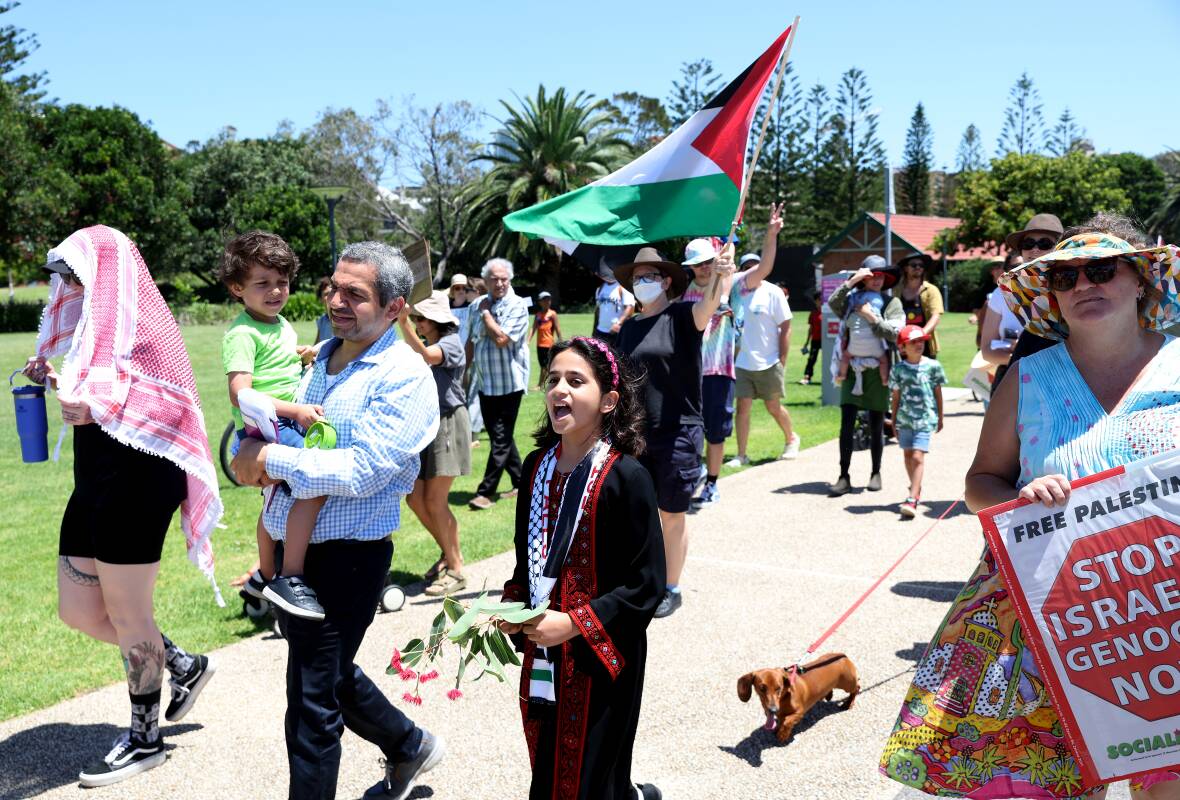
The column of hundreds marched to the beat of a chant led by the defiantly pitched voice of a nine-year-old girl holding a flowering gum branch.
She walked in the middle of the column, at her father's side, and was almost indistinguishable among the taller adults. But her voice carried.
"Gaza, Gaza, don't you cry," she called, to an echo of dozens of surrounding voices, "Palestine will never die."
Hala Elosmany's father, the Fletcher pharmacist Mohamed Elosmany, later told the amassed crowd under the shade of the Railway Sheds at Foreshore Park about his extended family, stuck without shelter near the Rafah Crossing on the Egyptian border but desperate not to leave their home in Gaza.
"They have been pushed from their homes," he told the crowd, "They don't want to leave Gaza, but there is no food, no electricity, or even shelter. They are not allowed to have tents. That is the plan. And you are the only hope for them."
Many of the protestors carried placards denouncing Israel over its attempted "genocide" of the Palestinian people living in the narrow Gaza Strip - a stretch of land roughly 41 kilometres long and 10 kilometres wide, sandwiched between the Mediterranean Sea and Israel and sharing a short border with Egypt in the Middle East. Gaza is populated by around two million people and is ruled by the Islamist group Hamas, who came to power in 2006.
Hamas has been designated a terrorist group by the UK and several other countries and is committed to the destruction of Israel. The group launched a sudden attack on Israel on October 7 that sparked the current escalating conflict and dire humanitarian crisis in the Middle East, killing around 1200 people.
More than 14,000 Palestinians in Gaza have been killed by Israeli air strikes and artillery in response to the attacks in October, according to the Hamas-run health ministry in Gaza.



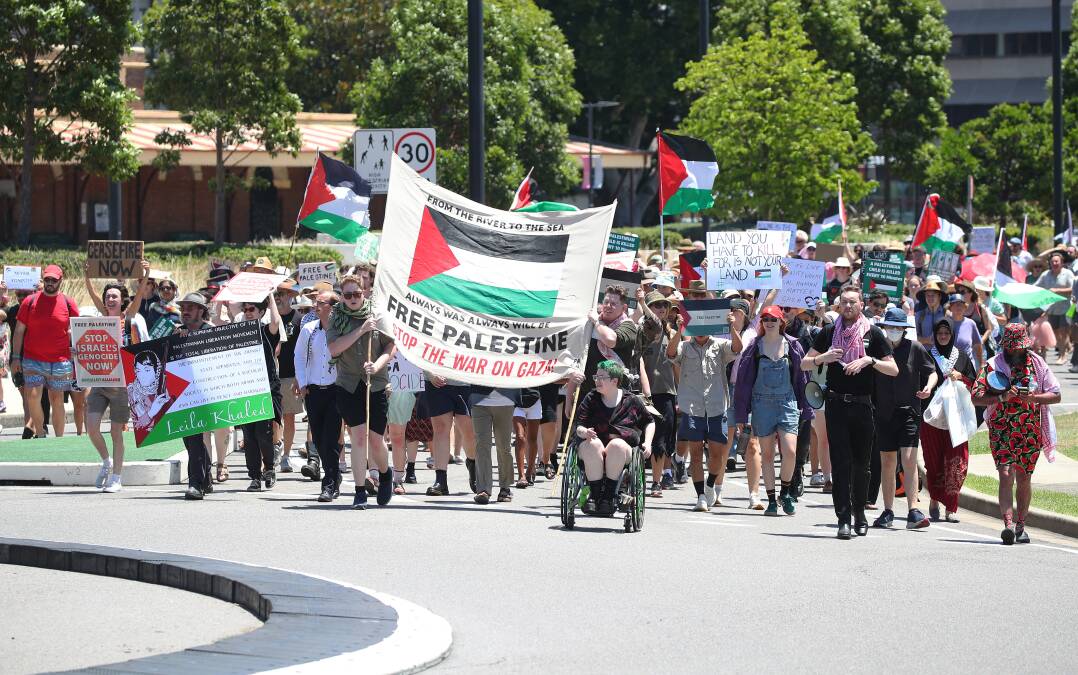


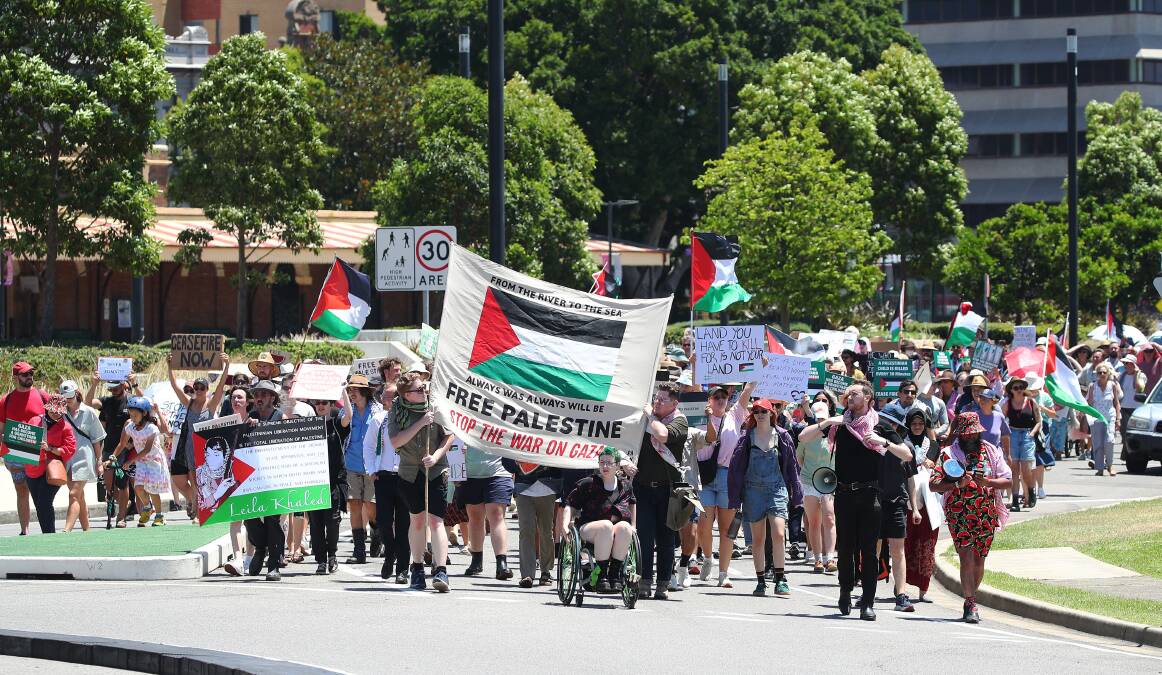


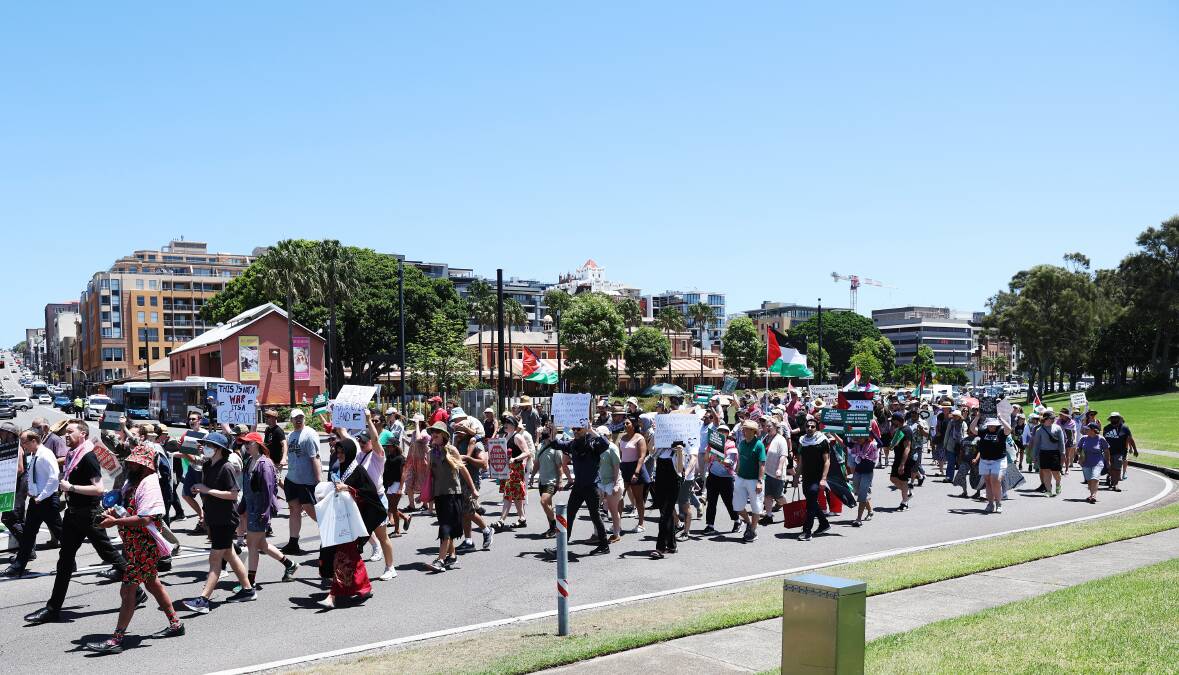









Mr Elosmany told the Newcastle Herald in October that members of his wife's family, including children, had been killed in the violence. He said the trauma had reached him and his children here in Newcastle.
On Saturday, he implored the crowd to "put yourself in their shoes".
"You can't remember when you had your last meal," he said, "You're hungry, you're thirsty, you're tired and you feel alone. You have lost all those who you loved, and you are probably injured."
He then held his phone up to the microphone and shared an extended clip of audio from the Middle East, with sounds of screaming and despair, littered with the sound of rockets flying and exploding and panic.
"The voices you can hear are not from a movie," Mr Elosmany said, "The sounds of the airstrikes are not from an action movie. They are real. This is what is happening in Gaza."

The Fletcher resident shared a string of harrowing personal stories from the centre of the conflict and implored those who attended to pressure their government representatives to act.
"They need to stop this genocide," he said, "Those who are still alive - their only hope is you. You are their only hope. They have been abandoned by the whole world. They are getting pushed out of Gaza, and that is the plan."
Among the speakers on Saturday was HSC student Lina Sawan, who is of Libyan heritage. She said she spoke as a "collective voice for my generation", refusing to "be silent in the face of injustice".
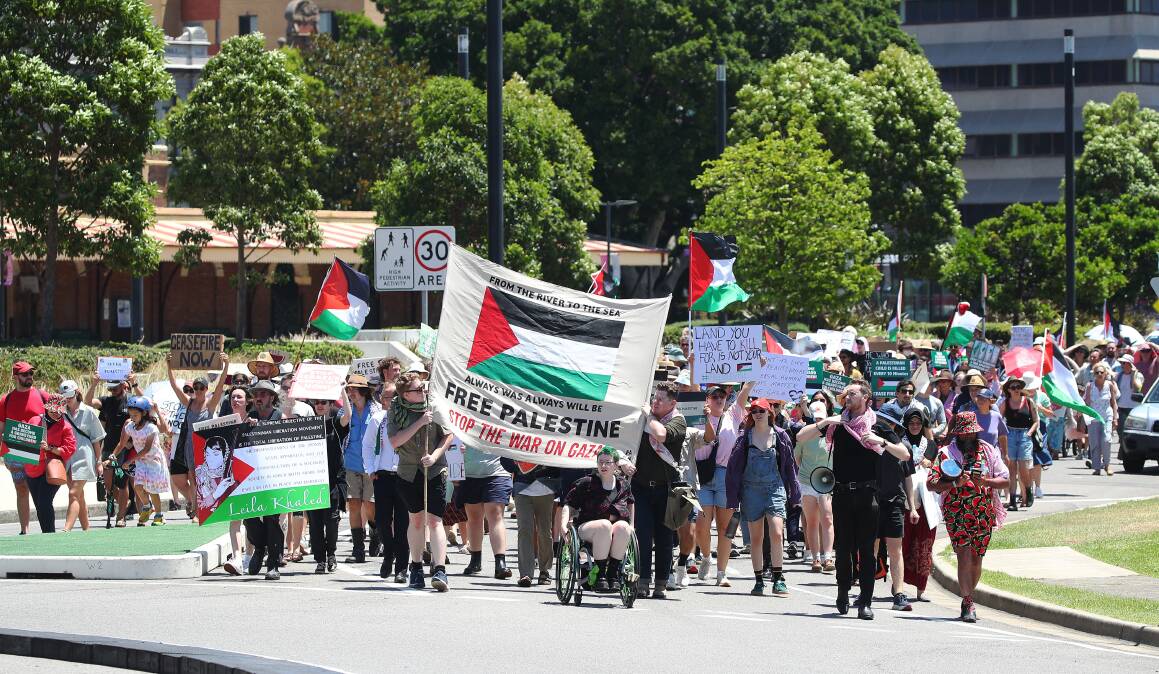
"Everything I learnt on pen and paper (at school) is coming true," she said, "As our world leaders sit and watch, we say, never again after the Holocaust. We say, never again after the South African Apartheid. And we say never again after the crime committed against (First Nation people).
"We watch the ongoing violence, the loss of innocent lives, and to think that this is what it took for the world to wake up and believe that this did not begin on October 7.
"We remain complicit to the crimes we are witnessing and cannot have our voices silenced."
"I want you to look in the mirror and ask, 'Where was I when Gaza was going through genocide?'" Mr Elosmany said, quoting South African solicitors who have accused Israel of genocide in the International Court of Justice in proceedings lodged on Thursday. "What did we do, as humanity, to stop them?"
The Department of Foreign Affairs and Trade has said more than 1500 Australians have left Israel and the Occupied Palestinian Territories since the violence erupted again last year following decades of unrest that began when Britain took control of the area of Palestine after the collapse of the Ottoman Empire around the time of the First World War.
The latest bout of violence has displaced more than 1.4 million people, and access to water and humanitarian supplies in Gaza and the Occupied Territories is extremely limited.
In October, Australia said it would commit $25 million to humanitarian assistance to Gaza and the Occupied Territories, but on January 11, leant personnel support - among a handful of other allied countries, including the UK and Canada - to US missile strikes on Yemeni rebels who have been attacking ships sailing in the Red Sea since November.
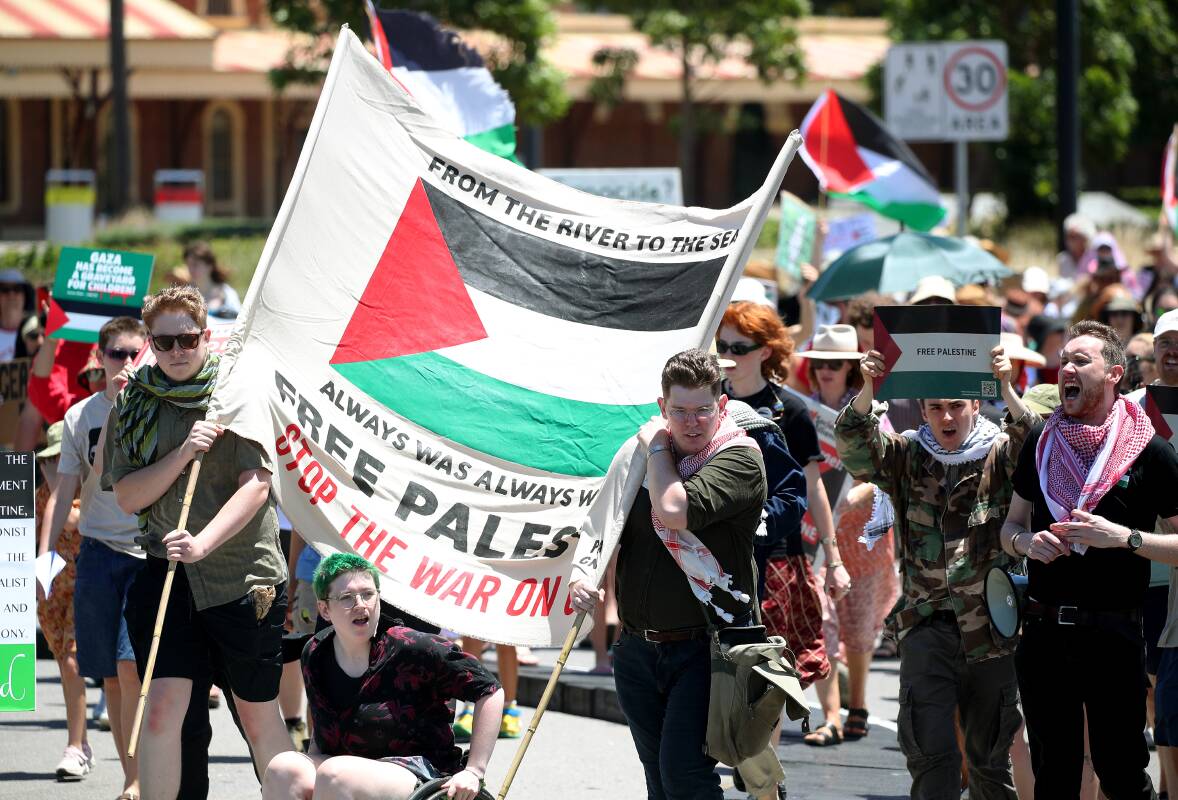
The Houthi - a group of Iran-backed rebels in Yemen - have aligned themselves against Israel and the US and consider themselves part of an Iranian-led "axis of resistance," along with Hamas in the Gaza Strip and Hezbollah in Lebanon.
In a joint statement issued by the White House on Thursday, January 11, the 10 governments who participated in the retaliatory strikes said the action was "in accordance with the inherent right of individual and collective self-defence, consistent with the UN Charter, against a number of targets in Houthi-controlled areas of Yemen".
"These precision strikes were intended to disrupt and degrade the capabilities the Houthis use to threaten global trade and the lives of international mariners in one of the world's most critical waterways," the statement said.
"Today's action demonstrated a shared commitment to freedom of navigation, international commerce, and defending the lives of mariners from illegal and unjustifiable attacks."

In November, Australia faced criticism and protest from Palestinian supporters at home over a lack of transparency surrounding its growing military export industry, leading to unclear perceptions and accusations that Australia was selling weapons to Israel.
In November, Greens Senator David Shoebridge said that Australia "doesn't tell us who we're exporting weapons to; doesn't tell us what the weapons are; doesn't tell us who profits here in Australia from the sale."
According to Hansard documents from Senate Estimates in October, 322 defence export permits relating to Israel have been issued in Australia since 2017, 52 of which were issued in 2023.
Members of the Newcastle Greens and Communist Party of Australia were represented at Saturday's demonstration, which was organised by Palestine Action Group Newcastle.







